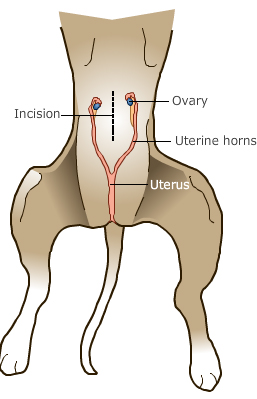Large and giant breed dogs, especially ones with deep chests such as Great Danes, Standard Poodles, Labradors and Golden Retrievers, are at increased risk for a life-threatening condition called GDV.
However, GDV can occur in ANY breed of dog—even a Chihuahua.
GDV= Gastric Dilatation & Volvulus or BLOAT
The stomach can become bloated if a dog eats or drinks and then runs around a lot, causing gas to build up in the stomach. It can happen if they eat a lot of certain foods, like bread. It can also happen for no apparent reason at all.
The bloated stomach expands and flips over—causing severe pain, compromised blood vessels and often, death.
The main clinical sign is a dog that is trying to vomit but not bringing anything up.
A surgical procedure called a Gastropexy can be done to help PREVENT this horrible condition. During this surgery, the stomach wall is tacked to the interior body wall so that it cannot twist or flip over. The stomach might still fill up with gas, but the life-threatening twisting or volvulus should not occur.
Dr. Amey is one of the few veterinarians in this area that regularly performs this preventive surgical procedure.
This preventive surgery can be done anytime but is usually offered at the time of spay or neuter so that your pet needs only one anesthetic.
GASTROPEXY SAVES LIVES! Talk with us about the risk of GDV in your pet.




